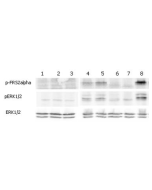Cookie Policy: This site uses cookies to improve your experience. You can find out more about our use of cookies in our Privacy Policy. By continuing to browse this site you agree to our use of cookies.
AdipoGen Life Sciences
anti-FGF-23 (human), mAb (FG322-3)

1. Recombinant human FGF23 (FC protein).
2. Recombinant human cleavage-resistant FGF23 (R179Q).
3. Recombinant mouse FGF23 (Fc protein).
4. Recombinant human IL-17 (FC protein) (negative control).
| Product Details | |
|---|---|
| Synonyms | Fibroblast Growth Factor 23; Tumor-derived Hypophosphatemia-inducing Factor |
| Product Type | Monoclonal Antibody |
| Properties | |
| Clone | FG322-3 |
| Isotype | Mouse IgG1κ |
| Immunogen/Antigen | Recombinant human FGF-23. |
| Application |
ELISA: (direct and indirect: 1:2’000-1:5’000) Note: Tested on recombinant proteins and/or target-protein transfected cell lines in ELISA, Western Blot and/or IHC. |
| Crossreactivity | Human |
| Specificity |
Recognizes human FGF-23. Does not cross-react with mouse FGF-23. |
| Purity Detail | Protein G-affinity purified. |
| Concentration | 1mg/ml |
| Formulation | Liquid. 0.2μm-filtered solution in PBS, pH 7.4. Contains no preservatives. |
| Isotype Negative Control | |
| Shipping and Handling | |
| Shipping | BLUE ICE |
| Short Term Storage | +4°C |
| Long Term Storage | -20°C |
| Handling Advice |
After opening, prepare aliquots and store at -20°C. Avoid freeze/thaw cycles. |
| Use/Stability | Stable for at least 1 year after receipt when stored at -20°C. |
| Documents | |
| MSDS |
 Download PDF Download PDF |
| Product Specification Sheet | |
| Datasheet |
 Download PDF Download PDF |
FGF-23 is a regulator of phosphate homeostasis. It upregulates EGR1 expression in the presence of KLBy. Acts directly on the parathyroid to decrease PTH secretion. Regulates the vitamin-D metabolism. Negatively regulates osteoblast differentiation and matrix mineralization. Defects in FGF-23 are the cause of autosomal dominant hypophosphataemic rickets (ADHR) and of hyperphosphatemic familial tumoral calcinosis (HFTC).
- Tumor-associated FGF-23-induced hypophosphatemic rickets in children: a case report and review of the literature: M.A. Burkhardt, et al.; Pediatr. Nephrol. 30, 179 (2015)
- Tumor-induced osteomalacia caused by phosphaturic mesenchymal tumor of the cervical spine: T. Nakamura, et al.; J. Orthop. Sci. 20, 765 (2015)
- Immunohistochemical and molecular detection of the expression of FGF23 in phosphaturic mesenchymal tumors including the non-phosphaturic variant: E. Shiba, et al.; Diagn. Pathol. 11, 26 (2016)
- MicroRNA expression in a phosphaturic mesenchymal tumour: D. Green, et al.; Bone Rep. 7, 63 (2017)
- A case of hyperparathyroidism which developed after resection of a fibroblast growth factor 23-producing tumor: K. Koikawa, et al.; Intern Med. 59, 2523 (2020)
- Tumor-induced osteomalacia caused by an FGF23-secreting myopericytoma : Case report and literature review: N.M. Bushart, et al.; Orthopade 49, (2020)
- Tumor induced osteomalacia - A long way toward correct diagnosis and management: L. Filipova, et al.; Bone Rep. 16, 101180 (2022)







